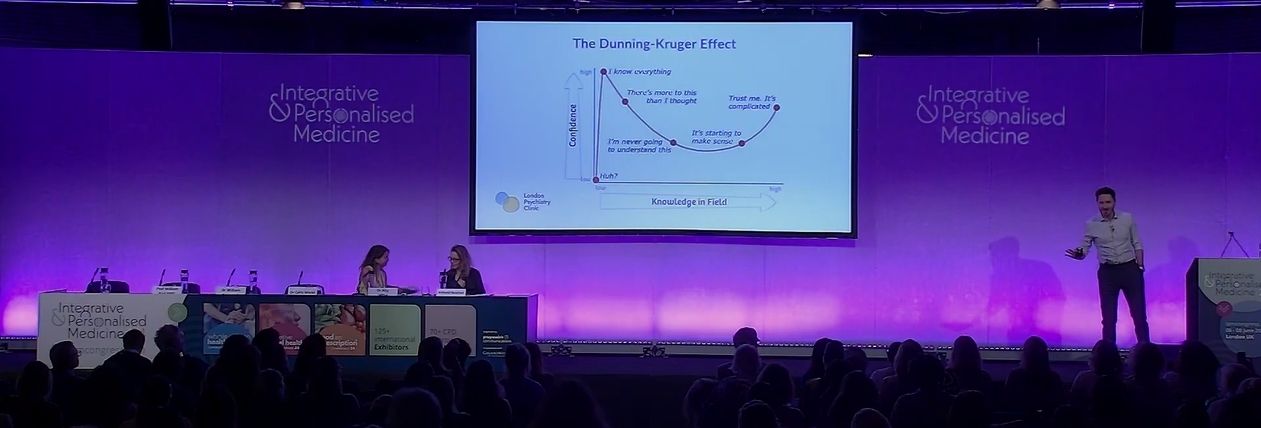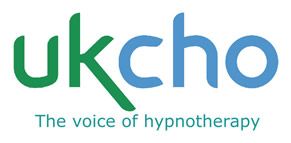ADHD: A General Overview for the Integrative Practitioner - Exploring the ADHD Spectrum

🏠︎ | Past Presentations | Integrative Mental Health | ADHD Treatment Insights
-
Event: IPM Congress 2024
-
Date: 7th June 2024
-
Estimated Read Time: 7–8 minutes
Introduction: Unravelling the Complexities of ADHD
At the IPM Congress 2024, Dr. Alberto Pertusa, an expert in integrative psychiatry, presented a thought-provoking session, "ADHD: A General Overview for the Integrative Practitioner." Beginning with a light-hearted nod to the Dunning-Kruger effect, Dr. Pertusa set the stage to dispel common misconceptions surrounding Attention Deficit Hyperactivity Disorder (ADHD). His session sought to offer a nuanced understanding of ADHD, challenging prevailing stereotypes and opening up discussions about its broader implications.
Demystifying ADHD: Beyond Attention Deficit
Dr. Pertusa started by addressing ADHD as a misnomer. The term "attention deficit" is misleading as it suggests a lack of attention, whereas the real issue is often one of attention regulation. Individuals with ADHD can experience hyperfocus when interested, juxtaposed by complete disinterest otherwise. This "all or nothing" nature reflects a deeper complexity within attentional networks, rather than a mere deficit.
Understanding ADHD Subtypes and the Spectrum
The talk transitioned to the classification of ADHD. Traditionally, the DSM criteria identify three subtypes: inattentive, hyperactive-impulsive, and combined. Dr. Pertusa noted that ADHD is a spectrum disorder, hinting that a significant portion of the population might exhibit traits associated with the condition.
In discussing the spectrum, Dr. Pertusa presented a hypothetical ranking, illustrating the subjective nature of ADHD diagnoses. While the most symptomatic individuals receive a formal diagnosis, many others may exhibit subclinical ADHD traits. This spectrum perspective highlights the challenge in neatly categorizing individuals, as those near the threshold may experience meaningful but less noticeable impairments.
Controversies and Alternative Perspectives: Dr. Amen and Beyond
Addressing controversies, Dr. Pertusa briefly mentioned Dr. Daniel Amen's work on ADHD subtypes using SPECT imaging. While Amen's methodologies and conclusions remain subject to debate due to limited empirical support, Dr. Pertusa acknowledged the allure of alternative narratives within holistic and integrative medicine circles. His discussion hinted at the tension between evidence-based conventional practices and alternative approaches in ADHD treatment, urging cautious exploration due to the lack of robust data.
Implications of Neural Mechanisms: The Role of the Default Mode Network (DMN)
Diving deeper into the neurophysiology of ADHD, Dr. Pertusa described the Default Mode Network (DMN). This network, although active when we are at rest, can be overactive in individuals with ADHD, leading to problems with constant rumination and difficulty in engaging in tasks. Conversely, the Task Positive Network (TPN) is engaged during focused cognitive activities. A key challenge for those with ADHD is effectively toggling between these two states.
The DMN, with its role in introspection and creativity, can be beneficial when channelled correctly but can also lead to self-critical thoughts and distractions. In contrast, activities that engage the TPN, like those that foster "flow," are seen as moments of heightened concentration and productivity.
Management and Treatment: Navigating Conventional and Integrative Approaches
Dr. Pertusa emphasized the complexity of managing ADHD, pointing out that while stimulant medications and cognitive behavioural therapy (CBT) remain treatment mainstays, individuals often seek integrative solutions. Here, lifestyle modifications, dietary interventions, and mindfulness practices are explored for their potential benefits, despite varying degrees of scientific backing.
He touched upon the promise and limitations of these alternatives: Omega-3 supplements show some benefit in research, while the ketogenic diet, albeit popular in discussion, lacks substantial empirical support for ADHD. Dietary aspects such as gut microbiome health and high doses of Omega-3s, zinc, and magnesium were noted as areas needing further exploration in the context of ADHD treatment.
Challenges and Future Directions
Dr. Pertusa acknowledged the difficulty in maintaining effective treatment regimes, especially given ADHD’s lifelong and neurodevelopmental nature. He encouraged lifestyle modifications, such as exercise and dietary mindfulness, as valuable components of a comprehensive management plan.
Further, the session discussed the potential of neurofeedback, although more rigorous research is required. Sleep, highlighted as an area of significant difficulty for those with ADHD, must be addressed with careful consideration of individual circadian patterns and disruptions.
Conclusion: Towards a Holistic Understanding of ADHD
Dr. Pertusa concluded by underscoring the importance of personalising ADHD treatment to cater to the individual nuances of the disorder. As understanding evolves, a patient-centered approach that balances conventional methods with integrative therapies may offer the most holistic care. Looking forward, the talk inspired practitioners to blend evidence-based practice with thoughtful experimentation in alternative treatments to best serve ADHD patients. This session provided a pivotal step in rethinking ADHD and left attendees with much to consider in their practices moving forward.
Further Reading
For those interested in exploring Dr. Alberto Pertusa's extensive work on ADHD and integrative psychiatry, here are some recommended articles and resources:
-
Rise of the Planet of the Neurodivergents: ADHD Influencers and Global Change
In this comprehensive lecture, Dr. Pertusa delves into the increasing cultural awareness of ADHD, discussing its symptoms, stigma, and the impact of social media influencers on global perceptions of neurodiversity. -
Evolution of ADHD: From Hunter-Gatherers to Modern Biohackers
This article explores the evolutionary perspective of ADHD traits, examining how characteristics advantageous in ancestral environments manifest in the modern world and their implications for individuals today. -
Discussing Alcohol, Dependency, Addiction, ADHD, Anxiety, Dopamine and Much More with One of London's Leading Psychiatrists Dr. Alberto Pertusa - Bonus Episode!
In this podcast episode, Dr. Pertusa shares valuable insights into the links between ADHD and addiction, the stages of dependency, and strategies to combat problematic alcohol use. -
Dr. Alberto Pertusa - Rise of the Planet of the Neurodivergents: ADHD Influencers and Global Change
A video presentation by Dr. Pertusa discussing ADHD in-depth, covering topics like symptoms, stigma, coping strategies, and neurodiversity.
For more resources and transcribed sessions from the Integrative Mental Health Conference, visit our Integrative Mental Health Conference page.
Get Access to the Full Conference Recording!
Submit the form below to unlock the complete video recording - don't miss out on insights from leading experts and thought leaders!
)
)
)

.jpg.png)
|https://cdn.asp.events/CLIENT_Progress_084371A2_5056_B739_5406DC209314F095/sites/IPM-2025/media/libraries/exhibitors/Apex-Energetics.png/fit-in/640x9999/filters:no_upscale())
|https://cdn.asp.events/CLIENT_Progress_084371A2_5056_B739_5406DC209314F095/sites/IPM-2025/media/libraries/exhibitors/Pure-Encapsulations-NEW3.jpg/fit-in/640x9999/filters:no_upscale())
|https://cdn.asp.events/CLIENT_Progress_084371A2_5056_B739_5406DC209314F095/sites/IPM-2025/media/libraries/exhibitors/Nordic labs NEW.png/fit-in/640x9999/filters:no_upscale())
|https://cdn.asp.events/CLIENT_Progress_084371A2_5056_B739_5406DC209314F095/sites/IPM-2025/media/libraries/exhibitors/Nelsons Corporate logo.jpg/fit-in/640x9999/filters:no_upscale())
|https://cdn.asp.events/CLIENT_Progress_084371A2_5056_B739_5406DC209314F095/sites/IPM-2025/media/libraries/exhibitors/Lingo_Made-by-Abbott-002-crop.png/fit-in/640x9999/filters:no_upscale())
|https://cdn.asp.events/CLIENT_Progress_084371A2_5056_B739_5406DC209314F095/sites/IPM-2025/media/libraries/exhibitors/Venn-Healthcare.png/fit-in/640x9999/filters:no_upscale())
|https://cdn.asp.events/CLIENT_Progress_084371A2_5056_B739_5406DC209314F095/sites/IPM-2025/media/libraries/exhibitors/Pharma-Nord-logo-full-size.jpg/fit-in/640x9999/filters:no_upscale())
|https://cdn.asp.events/CLIENT_Progress_084371A2_5056_B739_5406DC209314F095/sites/IPM-2025/media/libraries/exhibitors/Vibrant-Wellness.png/fit-in/640x9999/filters:no_upscale())
|https://cdn.asp.events/CLIENT_Progress_084371A2_5056_B739_5406DC209314F095/sites/IPM-2025/media/libraries/exhibitors/Nutrined.png/fit-in/640x9999/filters:no_upscale())
|https://cdn.asp.events/CLIENT_Progress_084371A2_5056_B739_5406DC209314F095/sites/IPM-2025/media/libraries/exhibitors/HealthMedica.jpg/fit-in/640x9999/filters:no_upscale())
|https://cdn.asp.events/CLIENT_Progress_084371A2_5056_B739_5406DC209314F095/sites/IPM-2025/media/libraries/exhibitors/Form-Med.png/fit-in/640x9999/filters:no_upscale())
|https://cdn.asp.events/CLIENT_Progress_084371A2_5056_B739_5406DC209314F095/sites/IPM-2025/media/libraries/exhibitors/QMed-Swiss-crop.png/fit-in/640x9999/filters:no_upscale())
|https://cdn.asp.events/CLIENT_Progress_084371A2_5056_B739_5406DC209314F095/sites/IPM-2025/media/libraries/exhibitors/Vitaspan.png/fit-in/640x9999/filters:no_upscale())
|https://cdn.asp.events/CLIENT_Progress_084371A2_5056_B739_5406DC209314F095/sites/IPM-2025/media/libraries/exhibitors/Maven-Health.png/fit-in/640x9999/filters:no_upscale())
|https://cdn.asp.events/CLIENT_Progress_084371A2_5056_B739_5406DC209314F095/sites/IPM-2025/media/libraries/exhibitors/HumanFirst.jpg/fit-in/640x9999/filters:no_upscale())
|https://cdn.asp.events/CLIENT_Progress_084371A2_5056_B739_5406DC209314F095/sites/IPM-2025/media/libraries/exhibitors/Hardy-Nutritionals.jpg/fit-in/640x9999/filters:no_upscale())
|https://cdn.asp.events/CLIENT_Progress_084371A2_5056_B739_5406DC209314F095/sites/IPM-2025/media/libraries/exhibitors/W_Wellness.png/fit-in/640x9999/filters:no_upscale())
|https://cdn.asp.events/CLIENT_Progress_084371A2_5056_B739_5406DC209314F095/sites/IPM-2025/media/libraries/exhibitors/Nuzest-logo.png/fit-in/640x9999/filters:no_upscale())
|https://cdn.asp.events/CLIENT_Progress_084371A2_5056_B739_5406DC209314F095/sites/IPM-2025/media/libraries/exhibitors/Oryx.jpg/fit-in/640x9999/filters:no_upscale())
|https://cdn.asp.events/CLIENT_Progress_084371A2_5056_B739_5406DC209314F095/sites/IPM-2025/media/libraries/exhibitors/Microba.jpg/fit-in/640x9999/filters:no_upscale())
|https://cdn.asp.events/CLIENT_Progress_084371A2_5056_B739_5406DC209314F095/sites/IPM-2025/media/libraries/exhibitors/BlueOak.png/fit-in/640x9999/filters:no_upscale())
|https://cdn.asp.events/CLIENT_Progress_084371A2_5056_B739_5406DC209314F095/sites/IPM-2025/media/libraries/exhibitors/Dimples.png/fit-in/640x9999/filters:no_upscale())
|https://cdn.asp.events/CLIENT_Progress_084371A2_5056_B739_5406DC209314F095/sites/IPM-2025/media/libraries/exhibitors/BetterYou.jpg/fit-in/640x9999/filters:no_upscale())
|https://cdn.asp.events/CLIENT_Progress_084371A2_5056_B739_5406DC209314F095/sites/IPM-2025/media/libraries/exhibitors/L-Nutra-Health.png/fit-in/640x9999/filters:no_upscale())
.png/fit-in/320x9999/filters:no_upscale()|https://cdn.asp.events/CLIENT_Progress_084371A2_5056_B739_5406DC209314F095/sites/IPM-2025/media/libraries/exhibitors/MicrosoftTeams-image-(3).png/fit-in/640x9999/filters:no_upscale())
|https://cdn.asp.events/CLIENT_Progress_084371A2_5056_B739_5406DC209314F095/sites/IPM-2025/media/libraries/exhibitors/ABNOBA.jpg/fit-in/640x9999/filters:no_upscale())
|https://cdn.asp.events/CLIENT_Progress_084371A2_5056_B739_5406DC209314F095/sites/IPM-2025/media/libraries/exhibitors/GLXG.png/fit-in/640x9999/filters:no_upscale())
|https://cdn.asp.events/CLIENT_Progress_084371A2_5056_B739_5406DC209314F095/sites/IPM-2025/media/libraries/exhibitors/Eagle-Clinical.png/fit-in/640x9999/filters:no_upscale())
|https://cdn.asp.events/CLIENT_Progress_084371A2_5056_B739_5406DC209314F095/sites/IPM-2025/media/libraries/exhibitors/Regenerative-Omegas_Ahiflower.png/fit-in/640x9999/filters:no_upscale())
|https://cdn.asp.events/CLIENT_Progress_084371A2_5056_B739_5406DC209314F095/sites/IPM-2025/media/libraries/exhibitors/Virun.jpg/fit-in/640x9999/filters:no_upscale())
|https://cdn.asp.events/CLIENT_Progress_084371A2_5056_B739_5406DC209314F095/sites/FIMedicine-2022/media/libraries/exhibitors/Altruvita.png/fit-in/640x9999/filters:no_upscale())
|https://cdn.asp.events/CLIENT_Progress_084371A2_5056_B739_5406DC209314F095/sites/IPM-2025/media/libraries/exhibitors/Terranova.png/fit-in/640x9999/filters:no_upscale())
|https://cdn.asp.events/CLIENT_Progress_084371A2_5056_B739_5406DC209314F095/sites/FIMedicine-2022/media/libraries/exhibitors/Proven-Biotics.png/fit-in/640x9999/filters:no_upscale())
|https://cdn.asp.events/CLIENT_Progress_084371A2_5056_B739_5406DC209314F095/sites/IPM-2025/media/libraries/exhibitors/PROTINA.jpg/fit-in/640x9999/filters:no_upscale())
|https://cdn.asp.events/CLIENT_Progress_084371A2_5056_B739_5406DC209314F095/sites/IPM-2025/media/libraries/exhibitors/Rayonex-hi-res.jpg/fit-in/640x9999/filters:no_upscale())
|https://cdn.asp.events/CLIENT_Progress_084371A2_5056_B739_5406DC209314F095/sites/IPM-2025/media/libraries/exhibitors/RegenerusLabs.png/fit-in/640x9999/filters:no_upscale())
|https://cdn.asp.events/CLIENT_Progress_084371A2_5056_B739_5406DC209314F095/sites/IPM-2025/media/libraries/exhibitors/Bristol-Fungarium.png/fit-in/640x9999/filters:no_upscale())
|https://cdn.asp.events/CLIENT_Progress_084371A2_5056_B739_5406DC209314F095/sites/IPM-2025/media/libraries/exhibitors/Doctors-Data.png/fit-in/640x9999/filters:no_upscale())
|https://cdn.asp.events/CLIENT_Progress_084371A2_5056_B739_5406DC209314F095/sites/IPM-2025/media/libraries/exhibitors/TheraLogo_2_Grey_v2.png/fit-in/640x9999/filters:no_upscale())
|https://cdn.asp.events/CLIENT_Progress_084371A2_5056_B739_5406DC209314F095/sites/IPM-2025/media/libraries/exhibitors/Pure-Maintenance-NEW.png/fit-in/640x9999/filters:no_upscale())
|https://cdn.asp.events/CLIENT_Progress_084371A2_5056_B739_5406DC209314F095/sites/IPM-2025/media/libraries/exhibitors/TotallyDerma.png/fit-in/640x9999/filters:no_upscale())
|https://cdn.asp.events/CLIENT_Progress_084371A2_5056_B739_5406DC209314F095/sites/IPM-2025/media/libraries/exhibitors/Natroceutics.png/fit-in/640x9999/filters:no_upscale())
|https://cdn.asp.events/CLIENT_Progress_084371A2_5056_B739_5406DC209314F095/sites/IPM-2025/media/libraries/exhibitors/OMED-Health.jpg/fit-in/640x9999/filters:no_upscale())
|https://cdn.asp.events/CLIENT_Progress_084371A2_5056_B739_5406DC209314F095/sites/IPM-2025/media/libraries/exhibitors/Tigon.jpg/fit-in/640x9999/filters:no_upscale())
|https://cdn.asp.events/CLIENT_Progress_084371A2_5056_B739_5406DC209314F095/sites/IPM-2025/media/libraries/exhibitors/Ancient---Brave.png/fit-in/640x9999/filters:no_upscale())
|https://cdn.asp.events/CLIENT_Progress_084371A2_5056_B739_5406DC209314F095/sites/IPM-2025/media/libraries/exhibitors/Wild-Nutrition_2.png/fit-in/640x9999/filters:no_upscale())
|https://cdn.asp.events/CLIENT_Progress_084371A2_5056_B739_5406DC209314F095/sites/IPM-2025/media/libraries/exhibitors/DR.Vegan.png/fit-in/640x9999/filters:no_upscale())
|https://cdn.asp.events/CLIENT_Progress_084371A2_5056_B739_5406DC209314F095/sites/IPM-2025/media/libraries/exhibitors/Nutri-Link.png/fit-in/640x9999/filters:no_upscale())
|https://cdn.asp.events/CLIENT_Progress_084371A2_5056_B739_5406DC209314F095/sites/IPM-2025/media/libraries/exhibitors/BodyBio-NEW.jpg/fit-in/640x9999/filters:no_upscale())
|https://cdn.asp.events/CLIENT_Progress_084371A2_5056_B739_5406DC209314F095/sites/IPM-2025/media/libraries/exhibitors/Herrens-Mark.png/fit-in/640x9999/filters:no_upscale())
|https://cdn.asp.events/CLIENT_Progress_084371A2_5056_B739_5406DC209314F095/sites/IPM-2025/media/libraries/exhibitors/BioCare_Logo_750x750.jpg/fit-in/640x9999/filters:no_upscale())
|https://cdn.asp.events/CLIENT_Progress_084371A2_5056_B739_5406DC209314F095/sites/IPM-2025/media/logos/HifasDaTerra.png/fit-in/640x9999/filters:no_upscale())
|https://cdn.asp.events/CLIENT_Progress_084371A2_5056_B739_5406DC209314F095/sites/IPM-2025/media/libraries/exhibitors/AONM.jpg/fit-in/640x9999/filters:no_upscale())
|https://cdn.asp.events/CLIENT_Progress_084371A2_5056_B739_5406DC209314F095/sites/IPM-2025/media/libraries/exhibitors/KBMO-Diagnostics.png/fit-in/640x9999/filters:no_upscale())
|https://cdn.asp.events/CLIENT_Progress_084371A2_5056_B739_5406DC209314F095/sites/IPM-2025/media/libraries/exhibitors/Keto-Mojo-Logo.new.jpg/fit-in/640x9999/filters:no_upscale())
|https://cdn.asp.events/CLIENT_Progress_084371A2_5056_B739_5406DC209314F095/sites/IPM-2025/media/logos/LifecodeGX.jpg.png/fit-in/640x9999/filters:no_upscale())
|https://cdn.asp.events/CLIENT_Progress_084371A2_5056_B739_5406DC209314F095/sites/IPM-2025/media/libraries/exhibitors/Iscador.jpg/fit-in/640x9999/filters:no_upscale())
|https://cdn.asp.events/CLIENT_Progress_084371A2_5056_B739_5406DC209314F095/sites/IPM-2025/media/libraries/exhibitors/Invivo.png/fit-in/640x9999/filters:no_upscale())
|https://cdn.asp.events/CLIENT_Progress_084371A2_5056_B739_5406DC209314F095/sites/IPM-2025/media/logos/Helixor70.jpg/fit-in/640x9999/filters:no_upscale())
|https://cdn.asp.events/CLIENT_Progress_084371A2_5056_B739_5406DC209314F095/sites/IPM-2025/media/logos/Geneva.png/fit-in/640x9999/filters:no_upscale())
|https://cdn.asp.events/CLIENT_Progress_084371A2_5056_B739_5406DC209314F095/sites/IPM-2025/media/libraries/exhibitors/Really-Healthy-NEW.png/fit-in/640x9999/filters:no_upscale())
|https://cdn.asp.events/CLIENT_Progress_084371A2_5056_B739_5406DC209314F095/sites/IPM-2025/media/libraries/exhibitors/Lamberts-NEW.png/fit-in/640x9999/filters:no_upscale())
|https://cdn.asp.events/CLIENT_Progress_084371A2_5056_B739_5406DC209314F095/sites/IPM-2025/media/libraries/exhibitors/Bare-Biology-Logo.jpg/fit-in/640x9999/filters:no_upscale())
|https://cdn.asp.events/CLIENT_Progress_084371A2_5056_B739_5406DC209314F095/sites/IPM-2025/media/libraries/exhibitors/FunctionalMind.png/fit-in/640x9999/filters:no_upscale())
|https://cdn.asp.events/CLIENT_Progress_084371A2_5056_B739_5406DC209314F095/sites/IPM-2025/media/libraries/exhibitors/The-Natural-Dispensary-NEW.jpg/fit-in/640x9999/filters:no_upscale())
|https://cdn.asp.events/CLIENT_Progress_084371A2_5056_B739_5406DC209314F095/sites/IPM-2025/media/libraries/exhibitors/Metagenics.jpg/fit-in/640x9999/filters:no_upscale())
|https://cdn.asp.events/CLIENT_Progress_084371A2_5056_B739_5406DC209314F095/sites/IPM-2025/media/libraries/exhibitors/Weleda-NEW.png/fit-in/640x9999/filters:no_upscale())
|https://cdn.asp.events/CLIENT_Progress_084371A2_5056_B739_5406DC209314F095/sites/IPM-2025/media/libraries/exhibitors/Viridian-Logo---MASTER-V3_Viridian-Logotype---Tag.png/fit-in/640x9999/filters:no_upscale())
|https://cdn.asp.events/CLIENT_Progress_084371A2_5056_B739_5406DC209314F095/sites/IPM-2025/media/libraries/exhibitors/CytoplanCropped.jpg/fit-in/640x9999/filters:no_upscale())
|https://cdn.asp.events/CLIENT_Progress_084371A2_5056_B739_5406DC209314F095/sites/IPM-2025/media/libraries/exhibitors/Balance-Healthcare-New.png/fit-in/640x9999/filters:no_upscale())
|https://cdn.asp.events/CLIENT_Progress_084371A2_5056_B739_5406DC209314F095/sites/IPM-2025/media/libraries/exhibitors/OxfordHealthspan1.png/fit-in/640x9999/filters:no_upscale())
|https://cdn.asp.events/CLIENT_Progress_084371A2_5056_B739_5406DC209314F095/sites/IPM-2025/media/libraries/exhibitors/Colab-Services.jpg/fit-in/640x9999/filters:no_upscale())
|https://cdn.asp.events/CLIENT_Progress_084371A2_5056_B739_5406DC209314F095/sites/IPM-2025/media/libraries/exhibitors/BOIRONcrop.jpg/fit-in/640x9999/filters:no_upscale())
)
)
)
-(1).png/fit-in/150x9999/filters:no_upscale())
)
)
)
)
)
)
)
)
)
)
)
)
)
)
)
)
)
)
)
)
)
)
)
---RGB---web.jpg.png/fit-in/150x9999/filters:no_upscale())
---RGB---web.jpg.png/fit-in/150x9999/filters:no_upscale())
)
)
)
)
)
)
)
)
)
)
)
)
)
)
)
)
)
.png/fit-in/150x9999/filters:no_upscale())
)
)
)
)
)
)
)
)
)
)
)

)
)
)
